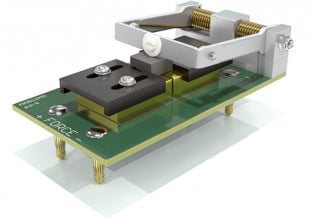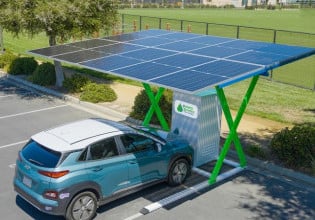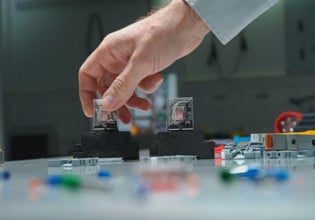Precision Current Measurement with Miniature Digital Sensor
With the TLI4970, Infineon Technologies AG is launching a high-precision current sensor, which requires only a sixth of the board space taken up by existing sensors on the market today. Using the TLI4970, it is possible to measure alternating and direct currents up to +/-50A. The fully-digital sensor does not require external calibration. As a result of implemented stray field suppression the sensor is extremely robust against external magnetic fields. It continues to measure with absolute precision even after years of continuous operation with the application's control quality level and also its efficiency remaining constant. It also provides additional functions such as fast overcurrent detection at a pre-configurable level. The TLI4970 is designed for use in solar inverters, charging devices and power supplies as well as for electric drives and for controlling energy-saving LED lighting units.
The measuring principle of the TLI4970 is based on Infineon’s proven Hall effect technology. This involves using integral Hall probes to detect the magnetic field of a current-carrying conductor. The TLI4970 dispenses with the otherwise usual field concentrators and, as a result, avoids hysteresis effects, which would lead to measuring inaccuracies.
The differential measuring principle integrated in the TLI4970 suppresses interference caused by external magnetic fields. Accordingly, the sensor achieves an extremely low offset of just 25mA. With conventional current measurement principles, the measuring accuracy is always governed by the ambient conditions (e.g. the temperature). In addition, substantial, non-deterministic drifts and ageing phenomena are encountered. These can have a negative impact on the accuracy of the current measuring, thus rendering precautions in terms of the system design necessary.
The TLI4970 precludes such dependencies due to the fact that it incorporates separate structures for measuring the temperature and the mechanical stress. By measuring both variables separately during operation, it is possible to constantly ensure effective compensation – the foundation for long-term measurement stability and, as such, for highly efficient, reliable and cost-optimized inverters and motors.
Besides high-precision current measurement, it is also possible to implement highly efficient protection of the power output stage. In the event of external short circuits, critical overcurrents can occur, for example. To keep the latency extremely short, the TLI4970 provides a parallel signal path. This allows the error condition detected by the sensor to be processed with an extremely short delay of less than 3 µs directly in the driver stage or in the microcontroller. To fine-tune the overcurrent threshold to the requirements of the application, the system developer can program both the current value and the subsequent filtering in the sensor.
The integration of the current bar in the SMD package permits complete calibration of the sensor on delivery. This also dispenses with the need for a subsequent, time-consuming calibration process by the customer during assembly. The TLI4970 is one of the first current sensors to transmit the measured values via the digital SPI interface. It integrates e.g. differential amplifiers, filters and signal processing and permits the implementation of a galvanically isolated measurement up to 600V operating voltage and up to 3,600V test voltage.
The TLI4970 will be offered in an extremely compact TISON (Thin Interstitial Small Outline No leads) SMD package with dimensions of just 7x7x1mm. The TISON SMD package makes automatic cost-efficient component placement possible. Samples of the TLI4970 are available. Series production is scheduled to begin in May 2014.
The TLI4970 evaluation kit makes evaluation easy. A graphic user interface allows the sensor to be programmed easily and tested out quickly for a whole range of system settings. The evaluation kit also includes an analog board, which converts the digital SPI output signals into analog signals. This enables developers to test the performance of the TLI4970 directly for their existing system designs with analog interfaces – also because Infineon has ensured the analog board is pin-compatible with conventional current sensors.






